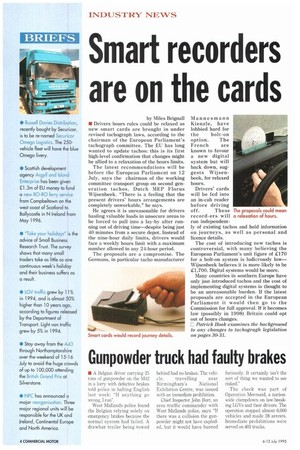Smart recorders are on the cards
Page 6

If you've noticed an error in this article please click here to report it so we can fix it.
by Miles Brignall • Drivers hours rules could be relaxed as new smart cards are brought in under revised tachograph laws, according to the chairman of the European Parliament's tachograph committee. The EU has long wanted to update tachos: this is its first high-level confirmation that changes might be allied to a relaxation of the hours limits.
The latest recommendations will be before the European Parliament on 12 July, says the chairman of the working committee transport group on second generation tachos, Dutch MEP Florus Wijsenbeek. "There is a feeling that the present drivers' hours arrangements are completely unworkable," he says.
He agrees it is unreasonable for drivers hauling valuable loads in unsecure areas to be forced to pull into a lay-by after running out of driving time—despite being just 40 minutes from a secure depot. Instead of the nine-hour daily limits, drivers would face a weekly hours limit with a maximum number allowed in any 24-hour period.
The proposals are a compromise. The Germans, in particular tacho manufacturer Mannesmann Kienzle, have lobbied hard for the bolt-on option. The French are known to favour a new digital system but will back down, suggests Wijsenbeek, for relaxed hours.
Drivers' cards will be fed into an in-cab reader before driving The proposals could mean a relaxation of hours. off. These record-ers will run independently of existing tachos and hold information on journeys, as well as personal and licence details.
The cost of introducing new tachos is controversial, with many believing the European Parliament's unit figure of ,C170 for a bolt-on system is ludicrously lowWijsenbeek believes it is more likely to be £1,700. Digital systems would be more.
Many countries in southern Europe have only just introduced tachos and the cost of implementing digital systems is thought to be an unreasonable burden. If the latest proposals are accepted in the European Parliament it would then go to the Commission for full approval. If it becomes law (possibly in 1998) Britain could opt out of hours changes.
E Patrick Hook examines the background to any changes to tachogragh legislation on pages 30-31.




































































































